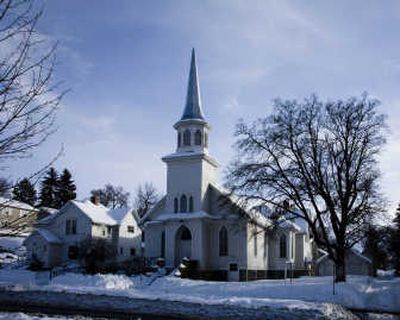A fresh start for old church

The white-steepled church at 217 E. Sixth St. in Moscow, Idaho, the oldest active church in the city, has changed hands for the fourth time in 121 years.
The landmark church now has a new congregation and a new beginning.
All Souls Christian Church, pastored by Evan Wilson, recently purchased the church from the Northwest Home Baptist Mission Board.
After the offer was officially accepted, the All Souls congregation held a worship service there on Dec. 9, with more than 100 people in attendance.
“I was very happy to see that the old building would continue to be used as a church,” said Shirley Gunther, who was confirmed there in 1947 when it was Our Savior’s Lutheran Church.
“We had been hoping and praying it would be passed on to a good congregation.”
Current trends for older churches usually see historic buildings sold to investors who use them for other purposes.
Such is the case with the Greystone Church in Pullman that is now an apartment building, and the oldest known standing church building in Moscow, the old Presbyterian Church on Third Street that was best known recently as the popular Micro Movie House, and now as the Body Art Tattoo shop.
“The Baptists were very gracious to us during the entire process and were very pleased to see that their historic church would continue being used by a Christian congregation,” said attorney Brian Thie, the treasurer for All Souls who handled the negotiations.
It was built by the First United Methodist Church of Moscow, with planning and fundraising beginning in 1876 and construction completed early in 1887 at a cost of $2,800, according to Kim Dahl at the Latah County Historical Society. The first service and dedication ceremony was held on Jan. 2, 1887.
The first time the church changed hands was in 1904, as the Methodists quickly outgrew the building and offered it up for sale. They bartered the church, parsonage and lot to the Norwegians of Our Savior’s for the land that congregation had recently purchased on Third Street – where the Methodists built their gray stone church with its well-known clock steeple.
The Sixth Street church was extensively expanded in 1948 to include Sunday school rooms, offices, fellowship hall and kitchen at a cost of $25,000, said Larry Lass, who serves as historian for Emmanuel Lutheran Church and was a member of Our Savior’s.
The third time the church started over with a new congregation was in 1968, when rapid growth in membership – caused by the merging of Our Savior’s with the Swedish First Lutheran Church – necessitated the sale of the building.
The merger took place with the agreement to build a newer building with a new name, now Emmanuel Lutheran Church on West A Street.
The Baptists held services in the Sixth Street church from 1968 to 2007, when they offered the building up for sale.
The road that the All Souls congregation has traveled to the point of moving into its first permanent building also is interesting.
In May 1990, Pastor Wilson and his wife, Leslie, started a home fellowship at their house on North Polk Street. The Wilsons, along with their three children, Davis, Michael and Graeme, made up the congregation at that first worship service.
Other families soon joined the Wilsons and they called their fellowship The Home Church. By 1995 they had outgrown their home and had to relocate their services to the American Legion’s log cabin on Howard Street.
They later held services in Logos School’s auditorium, and at the day care center above the grange hall on Main Street. They met at the Avalon House conference center, a former funeral home on Main Street, for five years before moving back to the American Legion’s log cabin in October 2005.
When the Sixth Street church was offered up for sale by the Baptists, the All Souls congregation decided to make an offer. But acceptance seemed unlikely, as All Souls had never kept track of church membership or kept records of giving.
“In the early days our entire budget was the coffee fund,” said Thie, the church treasurer. “When we moved out of the houses and started to pay rent at the various locations, we survived on $150 to $400 a month for all those years.”
Said Pastor Wilson: “I prepared myself for rejection before we ever made our first offer. The morning Brian (Thie) informed me that the Baptists had accepted our offer I was actually shocked.
“It took some moments for the reality to set in that we were going to be a congregation with a real church building.”